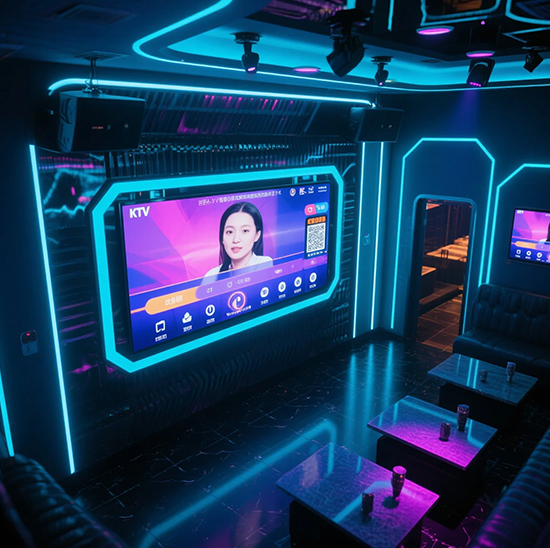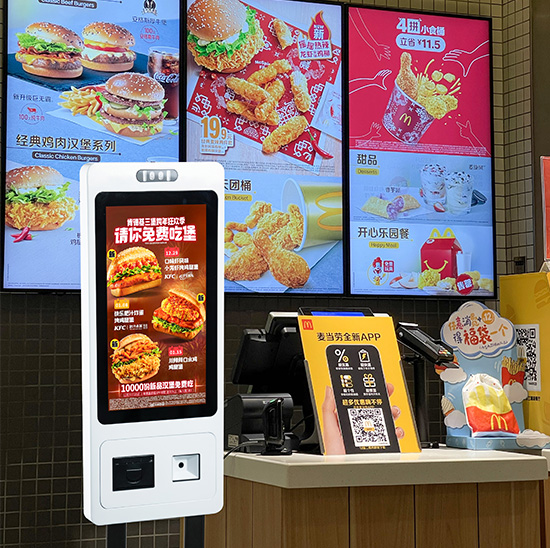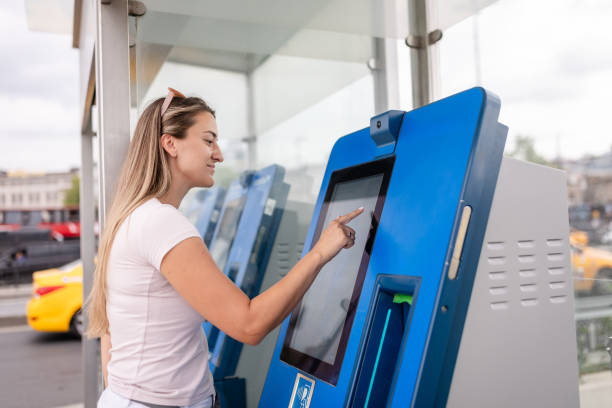Dans 2025, La technologie hôtelière continue d'évoluer, Et l'une des innovations les plus révolutionnaires est le kiosque d'auto-enregistrement de l'hôtel. Ces systèmes transforment l'expérience des clients en rendant les enregistrements plus rapidement, Plus facile, et plus efficace. Explorons tout ce que vous devez savoir sur le kiosque de l'auto-enregistrement de l'hôtel, de ses fonctionnalités et avantages à la façon de choisir et de mettre en œuvre le bon pour votre entreprise.
Qu'est-ce qu'un kiosque d'auto-enregistrement d'hôtel?

Un kiosque d'auto-enregistrement d'hôtel est un système automatisé conçu pour rationaliser le processus d'enregistrement des clients. Il permet aux clients de l'hôtel de terminer la procédure d'enregistrement indépendamment, contourner l'interaction traditionnelle de la réception. Cette technologie a gagné du terrain dans l'industrie hôtelière car elle sert de solution pour améliorer l'efficacité opérationnelle, Améliorer l'expérience des clients, et réduire les coûts pour les entreprises hôtelières.
L'objectif principal du kiosque auto-enregistrement est de fournir un plus rapidement, Alternative plus efficace aux vérifications manuelles. Les clients peuvent rapidement vérifier leurs chambres, effectuer des paiements, et même recevoir leur clé de chambre - toutes sans attendre en ligne. Pour les hôtels, Cela réduit la dépendance à l'égard du personnel de la réception, leur permettant de se concentrer sur d'autres domaines du service des clients, tout en améliorant la vitesse et la précision opérationnelles.
Un kiosque d'auto-enregistrement de l'hôtel se compose généralement de composants matériels clés, y compris une interface à écran tactile, ID et documents de documents pour la vérification, Dispens-clés de la chambre, et terminaux de paiement. Ces appareils sont intégrés au logiciel de gestion hôtelière pour accéder aux informations de réservation, Paiements de traitement, et émettre des clés de chambre. Les modules logiciels permettent des fonctions telles que la sélection des langues, recherche de réservation, et traitement des paiements, Rendre le système flexible et convivial pour les invités.
En comparaison avec les procédures d'enregistrement manuelles traditionnelles, Le kiosque auto-enregistrement offre une commodité et une automatisation importantes. Le processus d'enregistrement traditionnel implique souvent de faire la queue, Fourniture d'identification, et recevoir une clé de chambre d'un membre du personnel, tandis que le système d'auto-enregistrement de l'hôtel réduit ces étapes vers quelques interactions simples, Germer les invités à s'enregistrer à leur propre rythme, Rendre l'expérience beaucoup plus rapide et plus transparent.
Caractéristiques essentielles et fonctionnalités des kiosques d'auto-enregistrement de l'hôtel
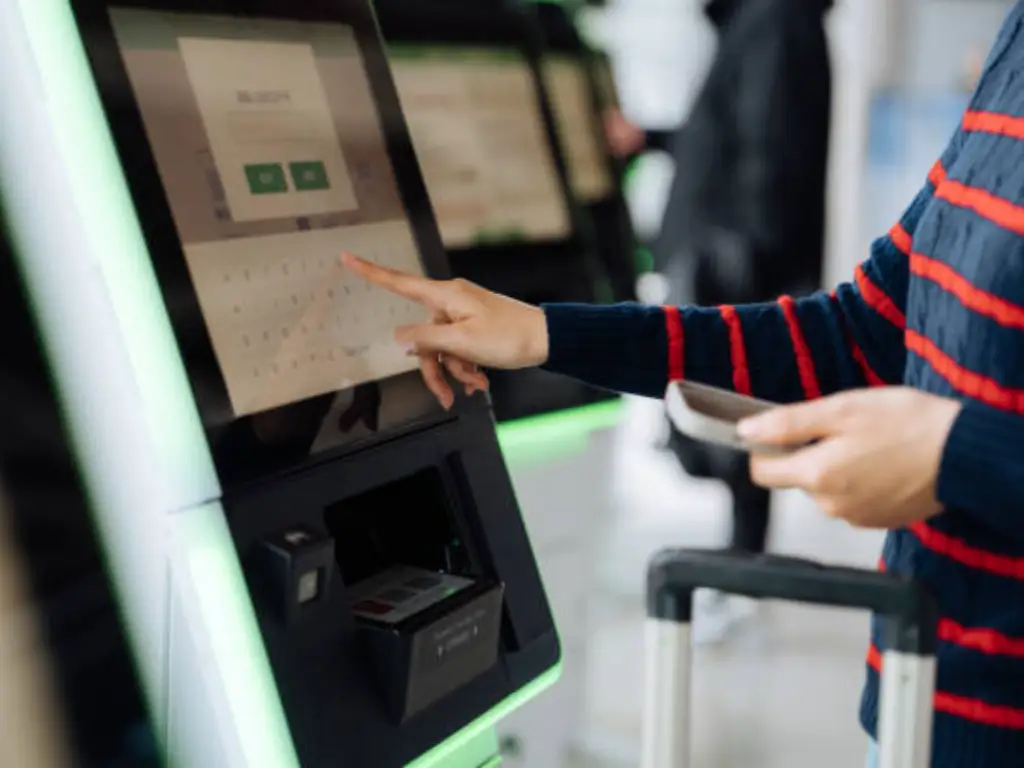
En ce qui concerne les kiosques d'auto-enregistrement de l'hôtel, La fonctionnalité est essentielle. Ces kiosques font bien plus que de vérifier les invités. Voici quelques caractéristiques essentielles qui en font un incontournable pour les hôtels modernes:
- Recherche de réservation: Un invité entre simplement son numéro de référence de réservation ou analyse leur identifiant, Et le kiosque tire instantanément leurs détails de réservation. Cela fait gagner du temps et assure la précision.
- Traitement des paiements: Les clients peuvent régler leur facture directement au kiosque, Que ce soit par carte de crédit, paiement mobile, ou même des portefeuilles numériques. C'est un excellent moyen de rendre les paiements plus lisses et de réduire les erreurs de transaction en personne.
- Disppensage de la clé de chambre: Après avoir terminé l'enregistrement, Le kiosque imprime une carte clé ou une clé de salle numérique. Plus d'attente de la réception pour remettre votre carte - lesutés obtiennent leur clé de chambre immédiatement.
- Support multilingue: Les kiosques d'auto-enregistrement sont conçues pour répondre aux invités internationaux en offrant des interfaces multilingues. Cela garantit que les barrières linguistiques n'interfèrent pas avec l'expérience d'enregistrement.
- Expérience personnalisée: Les kiosques avancés peuvent offrir des salutations personnalisées, Recommandations pour les équipements de l'hôtel, ou même les mises à niveau. Cela aide les hôtels à maintenir une touche personnelle, Même lorsque les invités s'enregistrent sans interaction directe.
- Intégration des données: Le kiosque d'auto-enregistrement devrait être en mesure de se synchroniser de manière transparente avec le système de gestion immobilière de l'hôtel (PMS). Cela garantit que la disponibilité des chambres est toujours mise à jour en temps réel, Et le processus d'enregistrement est fluide pour toutes les personnes impliquées.
Avantages supérieurs de l'utilisation d'un kiosque d'auto-enregistrement d'hôtel pour les clients et le personnel

La mise en œuvre des kiosques à l'enregistrement de l'hôtel offre un large éventail d'avantages pour les clients et le personnel de l'hôtel. Décomposons ces avantages pour comprendre pourquoi cette technologie devient une partie essentielle de l'industrie hôtelière.
Avantages pour les clients
- Commodité et vitesse: L'un des avantages les plus importants d'un kiosque d'auto-enregistrement de l'hôtel est la vitesse qu'il fournit. Les clients n'ont plus besoin d'attendre en longues lignes à la réception. Le processus d'auto-enregistrement est rapide et efficace, Permettre aux clients de terminer la procédure en quelques minutes, À tout moment du jour ou de la nuit. Que ce soit un enregistrement de fin de soirée ou un départ anticipé, Les kiosques permettent aux clients de s'enregistrer et de vérifier leur propre horaire, 24/7.
- Sentiment de contrôle et d'intimité: De nombreux invités apprécient l'autonomie qu'un kiosque d'auto-enregistrement fournit. Cela leur permet de gérer indépendamment leur enregistrement sans avoir à interagir avec le personnel de la réception, Réduire les pressions sociales. Cela est particulièrement bénéfique pour les clients qui préfèrent plus d'intimité ou ceux qui veulent se rendre rapidement dans leur chambre sans parler.
- Expérience sans contact: Post-pandémique, L'hygiène et la sécurité sont devenues des priorités importantes pour de nombreux voyageurs. Le kiosque propose une expérience de touche ou même entièrement sans contact via des intégrations mobiles ou des codes QR, Améliorer considérablement la sécurité des clients.
- Erreurs réduites: L'automatisation minimise le risque d'erreur humaine pendant le processus d'enregistrement. Avec les tâches de gestion du kiosque comme le traitement des paiements, affectation de salle, et distribution de cartes clés, Les chances de faire des erreurs dans les données des invités ou les informations de réservation sont considérablement réduites. Cela conduit à une expérience d'enregistrement plus lisse et plus précise pour toutes les personnes impliquées.
Avantages pour le personnel
- Efficacité accrue: Le personnel peut se concentrer sur la fourniture de services plus personnalisés, comme aider avec les tâches de conciergerie ou gérer les demandes complexes, tandis que le kiosque gère les enregistrements de routine. Cela améliore l'efficacité opérationnelle globale et réduit la pression sur le personnel de la réception.
- Réduction des coûts opérationnels: Les kiosques d'auto-enregistrement de l'hôtel aident à réduire les coûts opérationnels en automatisant des tâches de routine comme les enregistrements, paiements, et les affectations de chambre. Moins de membres du personnel sont tenus de gérer la réception pendant les heures de pointe, Permettre aux hôtels d'optimiser leur main-d'œuvre et d'allouer des ressources à d'autres domaines clés comme les services aux clients ou l'entretien.
- Image et modernisation de l'hôtel améliorés: L'installation de kiosques d'auto-enregistrement aide un hôtel à améliorer son image en tant que moderne, établissement technologique. Les clients s'attendent de plus en plus aux technologies avancées qui améliorent leur expérience, Et les systèmes d'auto-enregistrement reflètent un engagement à rester en avance sur la courbe dans la commodité et l'innovation. Cela peut être particulièrement attrayant pour les voyageurs avertis en technologie ou ceux qui apprécient rapidement, services sans couture.
Comment choisir les bons kiosques d'auto-enregistrement de l'hôtel pour votre entreprise

Choisir le droit Kiosque auto-enregistrement de l'hôtel peut avoir un impact significatif sur la satisfaction et l'efficacité opérationnelle des clients. Prendre une décision éclairée, Il est important d'évaluer plusieurs facteurs clés qui garantiront que le kiosque correspond aux besoins uniques de votre hôtel. Voici comment vous pouvez aborder le processus de sélection:
1. Évaluez les exigences spécifiques de votre hôtel
Avant de plonger dans les options de kiosque, Il est crucial de comprendre les besoins opérationnels spécifiques de votre hôtel. Considérez la taille de votre hôtel, le type de clientèle que vous servez, et le nombre d'invités qui vérifient généralement pendant les heures de pointe. Des hôtels plus grands ou des chaînes d'hôtels peuvent nécessiter une solution de kiosque plus robuste avec des fonctionnalités supplémentaires, comme le support multi-langues, Traitement à volume élevé, et intégration avec les systèmes de gestion hôtelière existants. Plus petit, hôtels de boutique, d'autre part, pourrait prioriser les conceptions de kiosques qui correspondent à la marque unique et à l'expérience des clients de l'hôtel.
2. Facilité d'utilisation pour les invités
Le kiosque auto-enregistrement devrait fournir une intuitive, Interface conviviale qui s'adresse à un large éventail d'invités, Des voyageurs avertis en technologie à ceux qui ne connaissent peut-être pas la technologie. Le kiosque doit guider les invités à travers le processus d'enregistrement étape par étape, minimiser la confusion. Pour les hôtels ciblant une clientèle diversifiée, Offrir un support multilingue et une intégration sans contact ou mobile peut améliorer l'expérience, surtout dans des emplacements internationaux ou très trafiques.
3. Intégration avec le système de gestion des propriétés (PMS)
Une considération clé lors du choix d'un kiosque est de s'assurer qu'elle s'intègre de manière transparente à votre système de gestion immobilière (PMS) . Le kiosque devrait pouvoir accéder à la disponibilité en temps réel des chambres, Paiements de traitement, et émettre des clés de la salle sans créer des écarts de données ou des retards. Vérifiez si le kiosque est compatible avec votre logiciel PMS actuel ou si une personnalisation supplémentaire sera requise pour l'intégration.
4. Personnalisation et marque
Pour les hôtels de boutique ou ceux qui visaient à offrir une expérience d'invité plus personnalisée, La conception et la fonctionnalité des kiosques devraient refléter la marque et l'atmosphère de l'hôtel. Certains systèmes de kiosque vous permettent de personnaliser la conception de l'écran, interface utilisateur, Et même le type de services offerts lors de l'enregistrement. Cela peut aider à renforcer l'ambiance unique de votre propriété, Faire en sorte que le processus d'enregistrement ressemble à une continuation de l'expérience globale des clients.
5. Maintenance et soutien
Considérez le soutien et la maintenance à long terme du kiosque. Les kiosques d'auto-enregistrement sont des points de contact critiques pour l'interaction des invités, Ils doivent donc être fiables. Choisissez un fournisseur comme Touche qui offre un service client solide, y compris les mises à jour logicielles régulières, maintenance matérielle, et le support de dépannage. Assurez-vous que le système est conçu pour une maintenance facile, avec des procédures de dépannage et des pièces de remplacement simples facilement disponibles.
6. Budget et ROI
Enfin, Évaluer la rentabilité de la solution de kiosque. Alors que les kiosques d'auto-enregistrement nécessitent un investissement initial, les avantages à long terme, comme réduit les coûts de main-d'œuvre, Amélioration de l'efficacité opérationnelle, et une satisfaction accrue des clients - l'emportez souvent sur les dépenses initiales. Facteur dans le retour sur investissement attendu (Retour de retour) en fonction de la taille et du volume de votre hôtel. Le kiosque droit peut rapidement se payer en rationalisant les opérations et en améliorant l'expérience globale des clients.
En évaluant soigneusement ces facteurs - la taille du hotel, expérience client, intégration du système, personnalisation, entretien, Et coût - vous pouvez sélectionner un kiosque d'auto-enregistrement hôtelier qui répond aux besoins de votre entreprise tout en améliorant l'efficacité opérationnelle et la satisfaction des clients.
Retour de retour: Analyse coûts-avantages des kiosques d'auto-enregistrement de l'hôtel
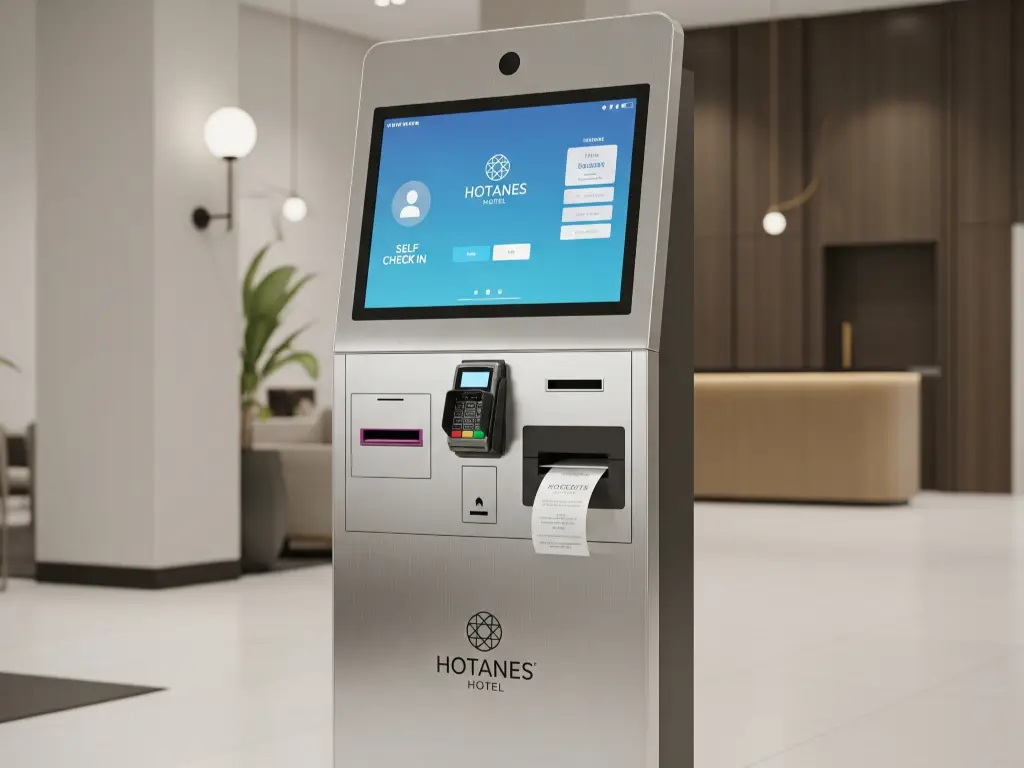
Lorsque vous envisagez d'investir dans les kiosques d'auto-enregistrement de l'hôtel, Les décideurs de l'hôtel doivent être soigneusement évalués les coûts par rapport aux avantages. Vous trouverez ci-dessous une ventilation des principales considérations financières et un retour sur investissement potentiel (Retour de retour) pour vous aider à prendre une décision éclairée.
Coûts d'investissement initiaux
Les coûts initiaux de la mise en œuvre des kiosques d'auto-enregistrement sont multiformes. Il s'agit notamment de l'achat de matériel, comme les kiosques eux-mêmes, écrans intégrés, terminaux de paiement, et distributeurs de clés. Les prix d'une seule unité peuvent varier considérablement, depuis $2,100 pour les modèles de base à plus $15,000 Pour les kiosques debout avancés ou personnalisés, Et même jusqu'à $30,000+ pour des solutions haut de gamme. Les licences logicielles sont également un composant important, Souvent structuré comme un abonnement mensuel ou annuel, Coût généralement $50 à $500 par mois par kiosque ou propriété. En plus, Budget pour les frais d'installation et les frais d'intégration cruciaux avec votre système de gestion de propriété existant (PMS), qui peut varier de quelques centaines de dollars pour les connexions API standard à plusieurs milliers de dollars pour des intégrations personnalisées plus complexes.
Coûts opérationnels en cours
Les dépenses en cours garantissent que votre système de kiosque reste efficace. Il s'agit notamment de frais de maintenance pour les mises à jour logicielles et l'entretien matériel, qui peut être inclus dans l'abonnement logiciel ou représenter 10-20% du matériel coûte chaque année. Les coûts du réseau sont nécessaires pour l'accès à Internet continu, et des fournitures comme les cartes-clés et le papier de réception sont mineurs mais récurrents. Alors que la plupart des mises à jour logicielles sont incluses, Soyez conscient des frais de mise à niveau futurs potentiels pour des améliorations importantes des fonctionnalités ou des remplacements matériels.
Économies de coûts
Les kiosques d'auto-enregistrement peuvent entraîner des économies de coûts importantes dans le temps. Le plus notable vient des réductions de coûts de main-d'œuvre, car moins de personnel de réception pourraient être nécessaires, surtout pendant les heures de pointe ou hors pointe, Autoriser la réaffectation des ressources. Les kiosques réduisent également l'utilisation du papier, Contribution à la fois aux économies de coûts environnementales et tangibles.
Augmentation des revenus
Les kiosques peuvent également générer des revenus supplémentaires. Sollowing Fulaling Wellling - Offreing Room Mosences OU COMMOSIONS Pendant l'enregistrement - génère un revenu supplémentaire sans intervention du personnel. En outre, Une expérience invitée améliorée conduit souvent à une satisfaction des clients plus élevée, entraînant plus de réservations répétées et de critiques en ligne positives qui stimulent les affaires futures.
Modèle de calcul du ROI
Pour calculer le retour sur investissement, Considérez cette formule simple:
ROI =(Économies totales + augmentation des revenus - investissement initial) / Investissement initial × 100%
Ce modèle vous aide à comprendre la rapidité.
Avantages non quantifiables
Mis à part les rendements financiers directs, Les kiosques offrent des avantages non quantifiables comme une image de marque améliorée, Amélioration de la compétitivité du marché, et une plus grande satisfaction des employés. Ces facteurs contribuent à la croissance à long terme, faire des kiosques auto-enregistrés de l'hôtel un investissement intelligent au-delà des finances immédiates.
Résumé des coûts d'investissement pour les kiosques d'auto-enregistrement de l'hôtel
Voici un résumé des coûts d'investissement typiques associés à la mise en œuvre d'un système de kiosque d'auto-enregistrement hôtel:
| Catégorie de coûts | Description | Plage de coûts estimés (Par kiosque / système) |
| Investissement initial | Dépenses initiales pour acquérir et configurer le système | |
| Acquisition de matériel | L'unité de kiosque physique(s) et périphériques essentiels (écrans, terminaux de paiement, Scanners d'identité, distributeurs de clés). | $2,100 – $15,000+ pour les kiosques debout de base à avancés; $600 – $1,200 pour les unités murales. Des solutions complètes peuvent dépasser $30,000. |
| Licence de logiciel | Frais pour le logiciel d'exploitation du kiosque, Souvent un abonnement récurrent. | $50 – $500+ par mois (par kiosque ou propriété, selon le modèle du fournisseur). |
| Frais d'intégration | Coûts pour connecter le kiosque à votre PMS, système de serrure de porte, et passerelles de paiement. | Des centaines à plusieurs milliers de dollars pour les intégrations API standard; potentiellement des dizaines de milliers pour des intégrations complexes ou personnalisées. |
| Installation & Installation | Services professionnels pour l'installation physique, configuration, et tests initiaux. | Quelques centaines à quelques milliers de dollars, en fonction de la complexité. |
| Formation du personnel | Former votre équipe à la gestion des kiosques, dépannage, et assistance aux clients. | Des centaines à plus de mille dollars, souvent inclus dans les forfaits de services initiaux. |
| Coûts opérationnels en cours | Dépenses récurrentes pour entretenir et faire fonctionner le système | |
| Entretien & Soutien | Mises à jour logicielles, corrections de bugs, contrats de maintenance matérielle. | 10-20% du coût du matériel par an ou inclus dans l'abonnement logiciel mensuel/annuel. |
| Consommables | Articles comme les cartes d'accès et les reçus. | Des dizaines à des centaines de dollars par mois, en fonction du nombre d'invités. |
| Coûts du réseau | Coût d’une connectivité Internet fiable pour le fonctionnement du kiosque. | Fait généralement partie des coûts d’infrastructure du réseau hôtelier existant. |
| Futures mises à niveau | Investissement pour des mises à jour majeures de versions logicielles ou des remplacements de matériel. | Variable, dépend des avancées technologiques et des politiques des fournisseurs. |
Veuillez noter: Les fourchettes de coûts fournies sont des estimations et peuvent varier considérablement. Pour une tarification précise et adaptée à vos besoins spécifiques, il est essentiel de consulter directement le fabricant du système de borne libre-service.
Mise en œuvre de bornes d'enregistrement automatique dans les hôtels: Meilleures pratiques et surmonter les défis
La mise en œuvre de bornes d'enregistrement automatique dans les hôtels peut considérablement améliorer l'efficacité opérationnelle et la satisfaction des clients., mais un déploiement réussi nécessite une planification minutieuse. Voici comment les mettre en œuvre efficacement et relever les défis potentiels.
1. Planification et installation
Avant d'installer des kiosques, Assurez-vous votre système de gestion immobilière (PMS) est compatible et que les kiosques peuvent s'intégrer de manière transparente. Travaillez avec le fournisseur de kiosque pour personnaliser le système en fonction de la marque et des opérations de votre hôtel. Choisissez les emplacements du kiosque facilement accessibles aux clients - idéalement près de l'entrée ou du hall, où ils peuvent rapidement commencer leur processus d'enregistrement.
2. Formation et transition du personnel
Une fois les kiosques en place, former votre personnel sur la façon d'aider les clients en cas de besoin, et sur le dépannage du système. Même si les kiosques automatisent une grande partie du processus, Le fait d'avoir du personnel qui connaît bien la technologie assure une expérience invitée plus fluide, surtout pendant la période de transition.
3. Éducation et soutien des clients
Assurez-vous que les clients sont informés des kiosques par signalisation, tutoriels interactifs, ou conseils du personnel. Un manque de compréhension peut provoquer la frustration et ralentir le processus d'enregistrement. Offrez une option aux clients pour contacter facilement le support s'ils rencontrent des problèmes lors de l'utilisation des kiosques.
4. Relever les défis potentiels
- Problèmes techniques: L'un des problèmes les plus courants est les dysfonctionnements techniques, comme les problèmes de connectivité ou les défaillances matérielles. Imalisez cela en choisissant un fournisseur de kiosque fiable et en investissant dans la maintenance régulière et les mises à jour logicielles. Aussi, avoir un système de support de sauvegarde en place pour les échecs critiques.
- Résistance aux clients: Certains invités, en particulier les personnes âgées ou ceux qui ne connaissent pas la technologie, peut résister à l'utilisation des kiosques. Pour aborder cela, Assurez-vous que le soutien du personnel est facilement disponible pour aider au processus d'enregistrement. Alternativement, proposer à la fois des bornes libre-service et des options d'enregistrement traditionnelles pendant la phase initiale.
- Problèmes de sécurité: Garantir la confidentialité des données est crucial. Mettre en œuvre des mesures de cybersécurité strictes, tels que le cryptage et le traitement sécurisé des paiements, pour protéger les informations des clients.
5. Surveillance et rétroaction continues
Après la mise en œuvre, surveiller régulièrement les performances du système et recueillir les commentaires des clients. Cela permet une identification rapide de tout problème et aide à affiner le système pour une efficacité améliorée..
En suivant ces meilleures pratiques et en traitant les défis potentiels de manière proactive, vous pouvez garantir une mise en œuvre réussie de bornes d'enregistrement automatique qui améliorent à la fois l'expérience client et les opérations de l'hôtel.
L’avenir des bornes d’enregistrement automatique dans les hôtels: Tendances et innovations dans 2025
L’avenir des bornes d’enregistrement automatique dans les hôtels s’annonce prometteur. Alors que la technologie continue d’évoluer, nous pouvons nous attendre à voir des fonctionnalités et des innovations encore plus avancées dans 2025. Certaines des tendances à surveiller incluent:
- Technologie de reconnaissance faciale: Imaginez entrer dans l'hôtel et voir votre visage reconnu instantanément, déclencher le processus d'enregistrement. La reconnaissance faciale est déjà testée dans les aéroports, et il est sur le point de révolutionner les enregistrements dans les hôtels dans un avenir proche.
- Solutions sans contact: L’hygiène et la sécurité devenant des priorités absolues pour les voyageurs, nous verrons probablement davantage d’options d’enregistrement sans contact, où les clients peuvent effectuer l'intégralité de leur processus d'enregistrement à l'aide de leur smartphone ou via des commandes vocales.
- Personnalisation améliorée: Les kiosques deviendront plus intelligents, offrir des services plus personnalisés tels que des surclassements de chambre en fonction des préférences des clients ou des recommandations concernant les équipements de l'hôtel.
- Caractéristiques de durabilité: Attendez-vous à ce que les kiosques intègrent des technologies plus respectueuses de l'environnement, comme des écrans économes en énergie, options sans papier, et même l'utilisation de matériaux recyclés dans la construction.
L'intégration de technologies avancées ne fera qu'améliorer la fonctionnalité et la commodité des bornes d'enregistrement automatique des hôtels., veiller à ce que ce système devienne un élément essentiel des opérations hôtelières modernes.
Si vous recherchez un fabricant de bornes libre-service fiable et expérimenté, TouchWo est le choix parfait. Depuis 2009, TouchWo a été à l'avant-garde de la fabrication de produits à écran tactile, proposer des kiosques de haute qualité adaptés aux besoins de votre entreprise. Avec une capacité de production annuelle impressionnante de 200 000 unités et un faible MOQ flexible de seulement 1, TouchWo vous assure de recevoir la solution idéale quelle que soit la taille de votre commande. Nous fournissons également des services OEM/ODM pour vous aider à personnaliser les kiosques pour votre marque. Contactez TouchWo aujourd'hui pour améliorer votre expérience client avec des solutions d'enregistrement automatique de pointe.

